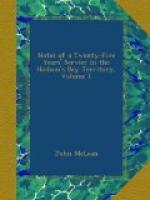With the view of carrying out these schemes, he proceeded to the North of Scotland, and prevailed on a body of Highlanders to emigrate to Red River. To induce them to quit their native land, the most flattering prospects were held out to them; the moment they set their foot in this land of promise, the hardships and privations to which they had hitherto been subject, would disappear; the poor man would exchange his “potato patch” for a fine estate; the gentleman would become a ruler and a judge in—Assineboine! Who could doubt the fulfilment of the promises of a British peer? His Lordship, therefore, soon collected the required number of emigrants—for the Highlander of the present day gladly embraces any opportunity of quitting a country that no longer affords him bread.
At the period in question, Red River district furnished the principal part of the provisions required by the North-West Company, and was a wilderness, inhabited only by wandering Indians, and abounding in the larger animals—elk and rein-deer in the woods, and buffalo in the plains.
As Red River flows into Lake Winnipeg, which discharges itself by Neilson’s river into Hudson’s Bay, and could therefore be included within the territory granted by the charter, our noble trader concluded that, by taking formal possession of the country, he would obtain the right of expelling other adventurers, merely by warning them off the Company’s grounds; and that, if the warning were disregarded, he could claim the aid of Government to enforce his rights, and thus ruin the North-West Company at a blow. His Lordship’s Governor was therefore instructed to issue a proclamation, prohibiting the North-West Company by name, and all others, from carrying on any species of trade within Red River district, and ordering such establishments as had been formed to be abandoned.
The North-Westers read the proclamation, and—prosecuted their business as before. In such circumstances quarrels were unavoidable, but they were generally settled with ink; a collision ultimately took place that led to the shedding of blood. The North-Westers had collected a large supply of provisions at their depot, and were about to forward it to the place of embarkation, when they were informed—falsely, as it afterwards appeared,—that the Governor intended to waylay and seize the provisions. A report, equally false, was brought to the Governor, that the North-Westers had assembled a strong force of half-breeds to attack the fort. These lying rumours led to an unhappy catastrophe.
The Governor sent out scouts to watch the North-West party; and ascertaining that they were on their march with an unusual force,—which they had brought in order to repel the attack which they supposed was to be made upon them,—he seized his arms, and marched with his whole party to meet them. The North-Westers seeing them approach, halted, and standing to their arms, sent forward one of their number to demand whether Mr. Semple and his party were for peace or war.




